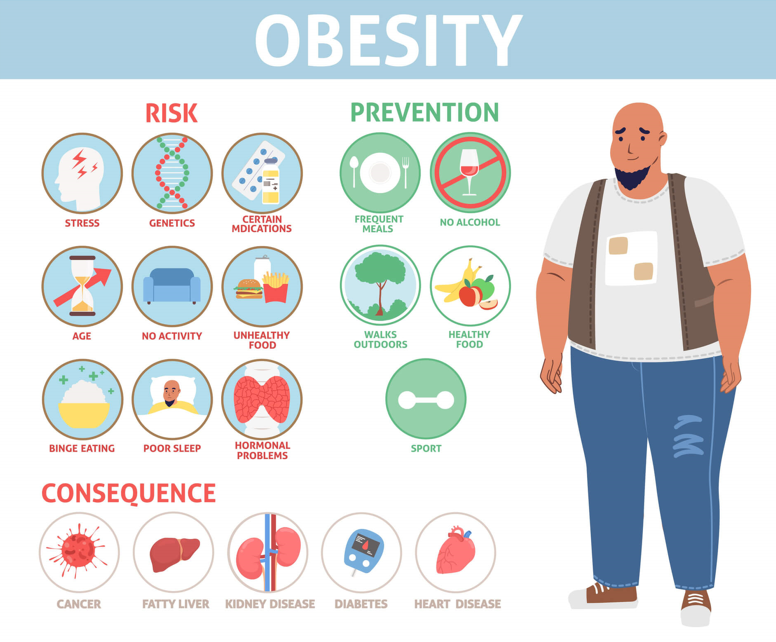Does Obesity Contribute to Cardiovascular Risk Factors?

Does Obesity Contribute to Cardiovascular Risk Factors?
Obesity has become a global health concern, impacting millions of individuals across all age groups. While it’s well-known that obesity influences overall well-being, one critical area of concern is its impact on cardiovascular health. Unfortunately, excess weight puts you at higher risk of heart disease and related conditions. Fortunately, with the right support and lifestyle changes, you can significantly reduce your risk and improve your overall health. At Cardiovascular Specialists of New England, we can help you understand the impact of obesity on heart health and make strides toward a healthier you. Here’s what our New Hampshire patients need to know about obesity and cardiovascular risk factors.
The Link Between Obesity and Cardiovascular Problems
Obesity is defined by an excessive accumulation of body fat, usually categorized by a Body Mass Index (BMI) of 30 or greater. This condition sets off a series of changes within the body, such as increased inflammation, hormone imbalances, and metabolic disruptions. These changes create the perfect storm for cardiovascular problems, leading to conditions like high blood pressure, high cholesterol, and insulin resistance. Without proper symptom management, patients can develop an increased risk of heart failure.
Be Aware of These Cardiovascular Risks
Managing obesity-related heart disease risks is essential to maintaining your overall health. The first step is to recognize the risk factors right away. If you have, or are concerned about developing, any of these conditions, reach out to the team at Cardiovascular Specialists of New England:
High Blood Pressure
Hypertension is one of the most significant risk factors for cardiovascular disease (CVD), and people with obesity are twice as likely to develop it than those with a healthy weight. Excess fat raises the body’s production of substances like angiotensin, a hormone that narrows blood vessels, causing blood pressure to spike.
High Cholesterol
Obesity can disrupt the body’s lipid metabolism, and therefore, individuals with obesity frequently report elevated triglyceride levels. They may also struggle with low HDL cholesterol (the good kind that helps remove excess cholesterol in the blood).
Type 2 Diabetes
Obesity and type 2 diabetes often go hand-in-hand. If you have already been diagnosed with type 2 diabetes, you’re likely already at a much higher risk of heart disease, too. Uncontrolled blood sugar levels can damage blood vessel walls, making them more prone to plaque build-up and other cardiovascular complications.
Sleep Apnea and Heart Complications
Many people with obesity also deal with sleep apnea, a condition where breathing repeatedly stops during sleep. This disrupts oxygen supply, leading to high blood pressure, irregular heartbeats, and an increased risk of cardiovascular disease.
Heart Failure Risk
When you look at all these risk factors together, it’s no surprise that heart failure can occur as a result of obesity. Over time, the increased workload on the heart caused by excess weight may weaken the heart muscle, impair blood circulation, and lead to chronic heart failure.
Can Weight Loss Reduce Cardiovascular Risks?
The good news is that even modest weight loss can drastically reduce obesity-related heart disease risks. Losing just a small percentage of your body weight can lead to substantial improvements in blood pressure, cholesterol levels, and blood sugar control. While significant weight loss may seem overwhelming and out of reach, you don’t need to lose a lot to start seeing meaningful health benefits. Several small changes can go a long way, and getting started is often one of the hardest steps!
Reducing Cardiovascular Risks Through Weight Management
The impact of obesity on heart health can’t be ignored. If you’re ready to make a change to your lifestyle, Cardiovascular Specialists of New England is here to help. Try these proactive steps for improving your overall health and reducing the risk of heart conditions:
- Eat a Heart-Healthy Diet—Focus on whole, unprocessed foods like lean proteins, vegetables, whole grains, and healthy fats. The Mediterranean diet is just one option that can drastically improve your heart health.
- Get Moving—Regular exercise is essential for weight management. Start with 30 minutes of moderate aerobic activity (like walking or cycling) five times a week. Don’t worry about running marathons—small, sustainable changes matter.
- Monitor Blood Pressure—Watch your blood pressure and discuss your results with our providers. Things like reducing sodium intake, staying hydrated, and minimizing stress can help control blood pressure levels.
- Quit Smoking—Smoking can worsen your cardiovascular risks. We encourage you to take steps to quit, such as joining support groups or trying products like nicotine patches. Quitting smoking is easier said than done, but the benefits are worth it!
- Prioritize Mental Health—Obesity is closely tied to mental health. Those with obesity are also more likely to live with depression and stress, as well as the added stigma of being overweight. Consider seeing a therapist to keep you on track toward your physical and mental health goals.
Take Action to Protect Your Heart Today
Heart health awareness isn’t just for World Obesity Day. At Cardiovascular Specialists of New England, we prioritize a healthy heart 365 days a year. If you’re concerned about your weight affecting your quality of life, don’t hesitate to reach out to us. We have a long track record of helping New Hampshire patients enhance their heart health and, in turn, improve their lives. Contact us today to make an appointment.
Stay Tuned! More information coming soon!

